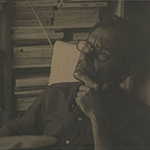QUI VIVE
WHO GOES THERE
The shore of the day by then on the edge of the finger
shifted
the boat surging rips open the other side of the lake
the reflections are not some reflections
some bent phosphorescent things
under the water
like the head of the sleeper
sunken and bare
follows the light of his distorted visions, speaking
The dinghy fades in the erased night
coastal sands arise again to the bed—here he sleeps a ground without his feet
without an eye to see there—no need, deafness.
some trees on the shore flick off brawny crabs, microbic wolves
while their hands lace with the branches of the sleeper
Their elasticated needles pass through the buttocks’ skin and ravage his back
the ploughing ripples through the sleeper’s mid
five or six serpents undulate below the ribs where quiver dorsal fins
muscles float in the wind and throughout the leap
sails the trembling of the tractor in the spine of the sleeper
—will he know in the end what got going across his back?
—who knows to where these gums in this agitated bay plunge or dwindle?
—against what defends him?
Alone the sleeper enters into it to his loss
because there they come, the hands which pluck out and the sleeper plucked,
they are going to draw him near before bursting with laughter scattering their teeth
anatomic rosary become again vertebrae—having him finished to fling the skeleton
on a bank which is not the shore but the antechamber of someone
amidst-adjoint-bays where reigns neither sun nor moon
nor link between them nor reception—boudoir of the shadows exists not in the house
from where the moment is ever once again he hopes to unescape himself
come back to the dinghy
but to be patient there
away once more hoping to extend his hand to the day.
MARCHE DANS UN MONSTRE
MARCH INTO A MONSTER
Man-a-bark
abandon the toys of your progress
in the silt of the lake the track
rises plunges without being heard
the bell sounds from the struts of the ship!
Man-a-bark, of the sea embrace the snake
and give your hand to the monster.
Follow him like your shadow among deserted streets
scrubbed by gusts cut from seawater
the tolling wind purged from the air wears you away
offshore cries a madman in the negative the hooks whistle!
Leap into the monster’s skin!
Nor the words that your diving suit holding this bird breath silenced.
Long ago the stars
bedded the sea
in the salt of your blood
the future of their pollen
well at the rate of your monster
you won’t have time
to put on your space suit.
Now march into your monster march!
Rove in your seven-league boots!
Your soles circling around yourself
yourself lost on an island a siren in your head
onwards your monster! walk with it!
Without showing it is invisible
like me.
Translator’s Note:
I came across Franck Gourdien’s book Qui Vive in a wonderful bookshop in Marseille, called L’Histoire de l’œil, which has a packed contemporary poetry section.
The two translated poems, “Who goes there” and “Step into a monster” demonstrate the stretching surreality of his poetry. The first, “Qui Vive” in the orginal, is both a map and body, taking in an unconscious, interior landscape. This corporeal space grows and mutates; simultaneously it tries to identify itself and plot a trajectory. This is suggested in the first line, “The shore of the day by then on the edge of the finger/ shifted/ the boat surging rips open the other side of the lake.” We move into increasing uncanny territory whilst remaining the conscious observer.
“Step into a monster / Marche dans un monster” is an invocation to action that at the same time dissolves the rational will. Evolving from “Who goes there,” the poem is a complete dissolution to our origins, “Long ago the stars/ bedded the sea /in the salt of your blood.” I enjoyed trying to translate the phrase “Homme-barque” and wanted to keep the suggestion of the command, “embarque.” In the end, I stayed quite close to the original with “Man-a-barque” and hopefully have kept the orality and peremptory tone with the added ‘a.’

Franck Gourdien’s poems lead us through the unconscious, warping perception with a musicality that echoes interiorly. With elements of Rimbaud, his poems connect surreal mental states with a lyricism that goes beyond natural and unnatural, achieving a kind of feral quality. Implicitly, there is an ecological dimension. He presents a psyche living and suffering in a distorted nature of its own making. The two poems translated come from Qui Vive (2017), published by La Barque. It is his first collection of poetry and another is due to be published this year. Photo by Courtois Stéphane.

Tom Tulloh is a translator from nearly all the cardinal points of London, but now lives in Marseille. Recent work includes three translated poems in Noria revue and a short story by Jean-Luc Raharimanana in Your Impossible Voice.

 BACK TO ISSUE
BACK TO ISSUE